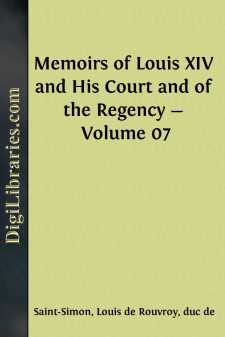History
- Africa 30
- Americas (North Central South West Indies) 50
- Ancient 68
- Asia 58
- Australia & New Zealand 8
- Canada 41
- Caribbean & West Indies 1
- Civilization 20
- Eastern Europe 12
- Europe 310
- Expeditions & Discoveries 60
- General 77
- Historical Geography 1
- Jewish 9
- Latin America 3
- Medieval 8
- Middle East 13
- Military 248
- Revolutionary 8
- Study & Teaching 5
- United States 353
- Western Europe 56
- World 13
History Books
Sort by:
The reign of Louis XIV. was approaching its conclusion, so that there is now nothing more to relate but what passed during the last month of his life, and scarcely so much. These events, indeed, so curious and so important, are so mixed up with those that immediately followed the King's death, that they cannot be separated from them. It will be interesting and is necessary to describe the...
more...
After having thus described with truth and the most exact fidelity all that has come to my knowledge through my own experience, or others qualified to speak of Louis XIV. during the last twenty-two years of his life: and after having shown him such as he was, without prejudice (although I have permitted myself to use the arguments naturally resulting from things), nothing remains but to describe the...
more...
Although, as we have just seen, matters were beginning to brighten a little in Spain, they remained as dull and overcast as ever in France. The impossibility of obtaining peace, and the exhaustion of the realm, threw, the King into the most cruel anguish, and Desmarets into the saddest embarrassment. The paper of all kinds with which trade was inundated, and which had all more or less lost credit, made...
more...
Few events of importance had taken place during my absence in Spain. Shortly after my return, however, a circumstance occurred which may fairly claim description from me. Let me, therefore, at once relate it. Cardinal Dubois, every day more and more firmly established in the favour of M. le Duc d'Orleans, pined for nothing less than to be declared prime minister. He was already virtually in that...
more...
Canaples, brother of the Marechal de Crequi, wished to marry Mademoiselle de Vivonne who was no longer young, but was distinguished by talent, virtue and high birth; she had not a penny. The Cardinal de Coislin, thinking Canaples too old to marry, told him so. Canaples said he wanted to have children. "Children!" exclaimed the Cardinal. "But she is so virtuous!" Everybody burst out...
more...
For a long time a species of war had been declared between the King of England and his son, the Prince of Wales, which had caused much scandal; and which had enlisted the Court on one side, and made much stir in the Parliament. George had more than once broken out with indecency against his son; he had long since driven him from the palace, and would not see him. He had so cut down his income that he...
more...
It is true that the late Madame was extremely unhappy; she confided too much in people who betrayed her: she was more to be pitied than blamed, being connected with very wicked persons, about whom I could give some particulars. Young, pretty and gay, she was surrounded by some of the greatest coquettes in the world, the mistresses of her bitterest foes, and who sought only to thrust her into some...
more...
Let me here relate an incident which should have found a place earlier, but which has been omitted in order that what has gone before might be uninterrupted. On the 16th of the previous July the King made a journey to Fontainebleau, where he remained until the 14th of September. I should suppress the bagatelle which happened on the occasion of this journey, if it did not serve more and more to...
more...
INTRODUCTION No library of Court documents could pretend to be representative which ignored the famous "Memoirs" of the Duc de Saint-Simon. They stand, by universal consent, at the head of French historical papers, and are the one great source from which all historians derive their insight into the closing years of the reign of the "Grand Monarch," Louis XIV: whom the author shows to be...
more...
The death of D'Avaux, who had formerly been our ambassador in Holland, occurred in the early part of this year (1709). D'Avaux was one of the first to hear of the project of William of Orange upon England, when that project was still only in embryo, and kept profoundly secret. He apprised the King (Louis XIV.) of it, but was laughed at. Barillon, then our ambassador in England, was listened...
more...











